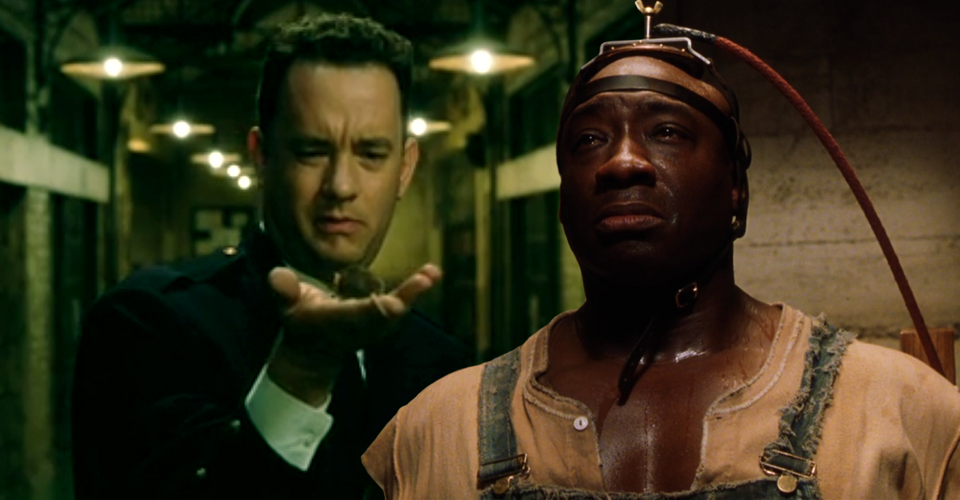The Green Mile Ending Explained

The 1999 fantasy drama based on Stephen King’s novel The Green Mile has been capturing audiences for decades thanks to its emotional story and deep, challenging themes—but what does the Oscar-nominated film’s ending really mean? The Green Mile concerns the 1935-set story of death row prison guard Paul Edgecomb (Tom Hanks) as he meets and is forever changed by the mild-mannered John Coffey (Michael Clarke Duncan), a physically imposing Black man sentenced to death for the rape and murder of two white girls.
Over the course of the film, directed and written by Frank Darabont, it not only becomes clear that Coffey is innocent, but that he possesses a range of supernatural abilities. The most notable of these is the ability to heal living things—although the film also implies that Coffey is capable of more. Like many Stephen King adaptations, The Green Mile balances its supernatural plot elements with deeper themes and ideas.
The Green Mile‘s ending ultimately sees Coffey executed for the crimes he didn’t commit. However, before he dies, he passes some of his abilities on to Paul, forever changing the guard’s life. It’s a bittersweet conclusion, but it also leaves one or two burning questions that require closer inspection.
Why John Coffey Accepts His Fate In The Green Mile

As The Green Mile reveals that Coffey is innocent of the crime he was convicted for, his execution makes a sad ending for the character. However, despite his powers and his substantial size, Coffey makes no real attempt to resist his fate. Although some Stephen King endings are generally unsatisfying, The Green Mile‘s conclusion is as touching as it is heartbreaking, as it sees Coffey accepting his cruel fate.
A man of Coffey’s size could undoubtedly have made his execution difficult for the guards, and his powers could have potentially helped him escape. However, he opts not to use either of the tools at his disposal, most likely as he’s a gentle soul. This actually makes his ending even sadder, as it highlights his innocence, but he’s simply not capable of exploiting his own strength if it means hurting or upsetting others.
Why John Coffey Smiles At His Execution

Not only does Coffey allow his unjust execution to go ahead, but he actually smiles in his final moments. It makes Coffey’s death even harder to watch, particularly as The Green Mile has some real-life inspiration behind it. As he’s made no secret of how scared he is to die, it’s a little odd to see Coffey offer one last smile before he dies, but it’s likely more than just the big man putting on a brave face.
It’s implied that Coffey knows he’s passed on some of his abilities to Edgecomb, and it’s possible that his smile is that knowledge reassuring him. Coffey knows that Edgecomb is a kind man (it’s why he helped him, after all), and so he knows that his gifts will be put to good use after he’s gone. It’s also possible that the smile was intended to comfort Paul, who was equally upset by Coffey’s execution.
How Much Longer Does Paul Edgecomb Live & Is His Age A Curse?

Working out exactly how old The Green Mile‘s Paul Edgecomb lives requires some logical estimation, as the film never fully discloses the nature or extent of Coffey’s healing abilities. Still, using Mr. Jingles as the basis for how Coffey’s healing affects the aging process, it’s clear that Edgecomb might live for quite some time. In the film, Paul is shown to be 108-years-old in its framing scenes – proof that Coffey’s ability has extended his life.
Rough mathematical analysis of Mr. Jingles’ aging relative to Paul’s, it’s possible that the former guard will live for a minimum of 600 years. Still, with Coffey having passed the ability on to Edgecomb, it could be that he now possesses a form of immortality – something which he sees as punishment for his part in Coffey’s death. Even after already outliving many of the people he loves, Paul has no idea of how long he’ll live, but if The Green Mile‘s Mr. Jingles is anything to go by, he could be around for a very, very long time.
Is The Green Mile’s Ending The Same In The Book?

The Green Mile‘s ending is notoriously sad, but Stephen King’s original book is actually even sadder. One of the biggest changes is that in the book, Mr. Jingles actually dies shortly before Elaine, and while that’s sadder in one sense it does offer a better indication of Paul’s eventual fate. Other notable changes are to do with the story’s framing scenes – in the book, Paul is writing his memoirs, whereas in the film, the movie Top Hat is used to link Paul’s past to his present.
The Green Mile’s Karma Theme Explained

Like with so many other Stephen King movies, The Green Mile explores some deeper themes, but perhaps none are more prevalent than the running thread of karmic payback. Coffey does his best to help the film’s nicer characters, and he makes sure that the less pleasant guards and inmates meet their appropriate fates. Ironically, the only person who doesn’t seem to get the ending he deserves is Coffey himself, as he resigns to his death sentence despite his innocence. The film’s karmic theme—and John Coffey’s place within it—is actually a major factor in what The Green Mile‘s ending really means.
The Real Meaning Of The Green Mile’s Ending

Within The Green Mile‘s narrative, John Coffey fits squarely within common messianic tropes. He’s a powerful, innocent, and misunderstood character who faces persecution for something he didn’t do. Regular Stephen King collaborator Frank Darabont doesn’t avoid leaning into that trope, with Coffey “judging” those around him (by using a form of low-level telepathy or empathic abilities), and healing those he believes to be worth saving.
Ultimately, Coffey accepts his fate as he doesn’t want to continue living in such a cruel world. This itself comes with some decidedly biblical connotations which further Coffey’s status as a messianic figure. Of course, the film also sees Mr. Jingles brought back from the dead, and John Coffey’s initials themselves could be seen as another messianic reference.
Exactly how many of these biblical ideas and themes were intended to be part of The Green Mile‘s story isn’t clear. However, the film does make some statements about kindness and prejudice, which makes it at once an unsettling non-horror Stephen King movie and a deeply moving story. The specific point of The Green Mile‘s ending is to make the audience think, and its fantastical twist continues to do just that even decades later.
About The Author

















